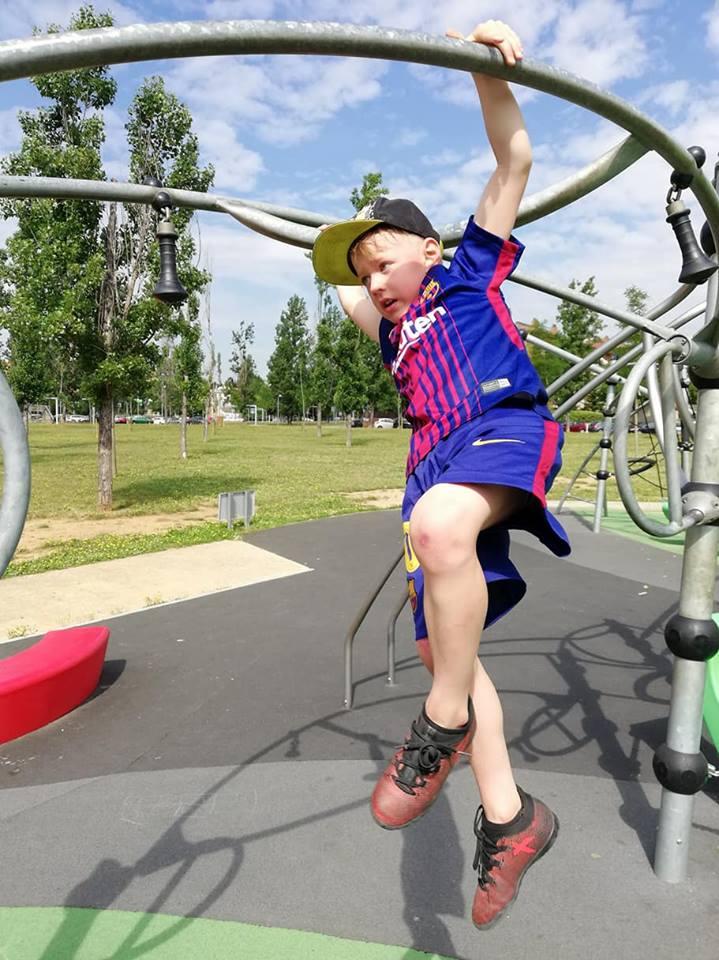Data gathered in Finland, Belgium and Portugal reveal that Finnish children are ahead of their European peers in motor skills at ages 6 to 10 years

Credit: University of Jyväskylä
Data gathered in Finland, Belgium and Portugal reveal that Finnish children are ahead of their European peers in motor skills at ages 6 to 10 years. Differences in motor skills increase with age and independently of the remarkable differences in overweight across the countries.
The gross motor skills of around 3,300 children were evaluated between 2008 and 2016 by using the internationally well-known KTK test. The test measures body coordination and balance, which are known to be fundamental for any kind of human movement.
“Motor skills are assumed to develop with age but especially in Portuguese children the results suggest weak development between the age of 6 and 10 years,” says post-doctoral researcher Arto Laukkanen at the Faculty of Sport and Health Sciences. “Belgian children came close to the Finnish children, although the difference was significant for the Finnish children’s advantage in this comparison, too.”
According to the researchers, it is alarming that around 40 percent of Portuguese children’s motor skills were found to be weak or very weak. In comparison, the corresponding figure was around 10 percent in Finnish and Belgian children.
“Internationally, it has been found that a remarkable proportion of today’s children are not developing in motor skills at the rate of the past decades,” says Laukkanen. “In the USA, as much as 80 percent of children score below the norms determined in the 1980s. There are no longitudinal studies performed in Finland but the results suggest that Finnish children are learning motor skills at a rate which is close to the old days.”
Overweight and gender differences explain only some of the differences across the countries
In earlier studies overweight has been associated with the slow developmental rate of motor skills in childhood. This phenomenon was supported in the current study. Of the Portuguese children participating in the study, around 30 percent were overweight. In Finland, 24 percent of the children were overweight and in Belgium the figure was about 20 percent. It’s worth noting, where motor skills seemed to develop equally in normal and overweight Finnish children, motor skills seemed to develop modestly in both normal and overweight children, especially in Portuguese children. Therefore, overweight explained only a small part of the difference in motor skills in children across the countries.
“The results suggest that differences in motor skills across the countries come about through many other factors than just overweight,” says Laukkanen.
Boys were found to outperform girls in motor skills in all the countries compared. Gender differences were remarkably smaller though in Finnish and Belgian children compared to their Portuguese peers.
“It appears that gender differences in motor skills are the largest where the overall level of motor skills is lower. Correspondingly, the high overall level of motor skills seems to equalize gender differences,” says Laukkanen.
The vast majority of the cross-cultural differences in children’s motor skills could not be explained. Researchers from the three different nations have proposed some potential factors behind the motor skill differences in addition to overweight and gender differences.
“It may feel surprising that based on the previous studies Portuguese children are known to participate more in organized sports when compared to Finnish and Belgian children,” says Laukkanen. “On the other hand, Finnish children are known to be at the top internationally in independent mobility, a fact which is linked to a higher rate of active play. A sports culture based on organized sports participation may not thus necessarily guarantee the necessary equality, quantity and quality of physical activity in children.”
The original article “Comparison of motor competence in children aged 6?9 years across northern, central, and southern European regions” was published in Scandinavian Journal of Medicine and Science in Sports.
###
The research was conducted in cooperation with Senior Researcher Arja Sääkslahti from the Faculty of Sport and Health Sciences at the University of Jyväskylä, Tommi Vasankari and Pauliina Husu from the UKK Institute, Matthieu Lenoir and Farid Bardid from Ghent University, and Vitor P. Lopes from Instituto Politécnico de Bragança. The study was funded by the Ministry of Education and Culture in Finland.
Media Contact
Arto Laukkanen
[email protected]
358-408-053-611
Original Source
https:/
Related Journal Article
http://dx.




